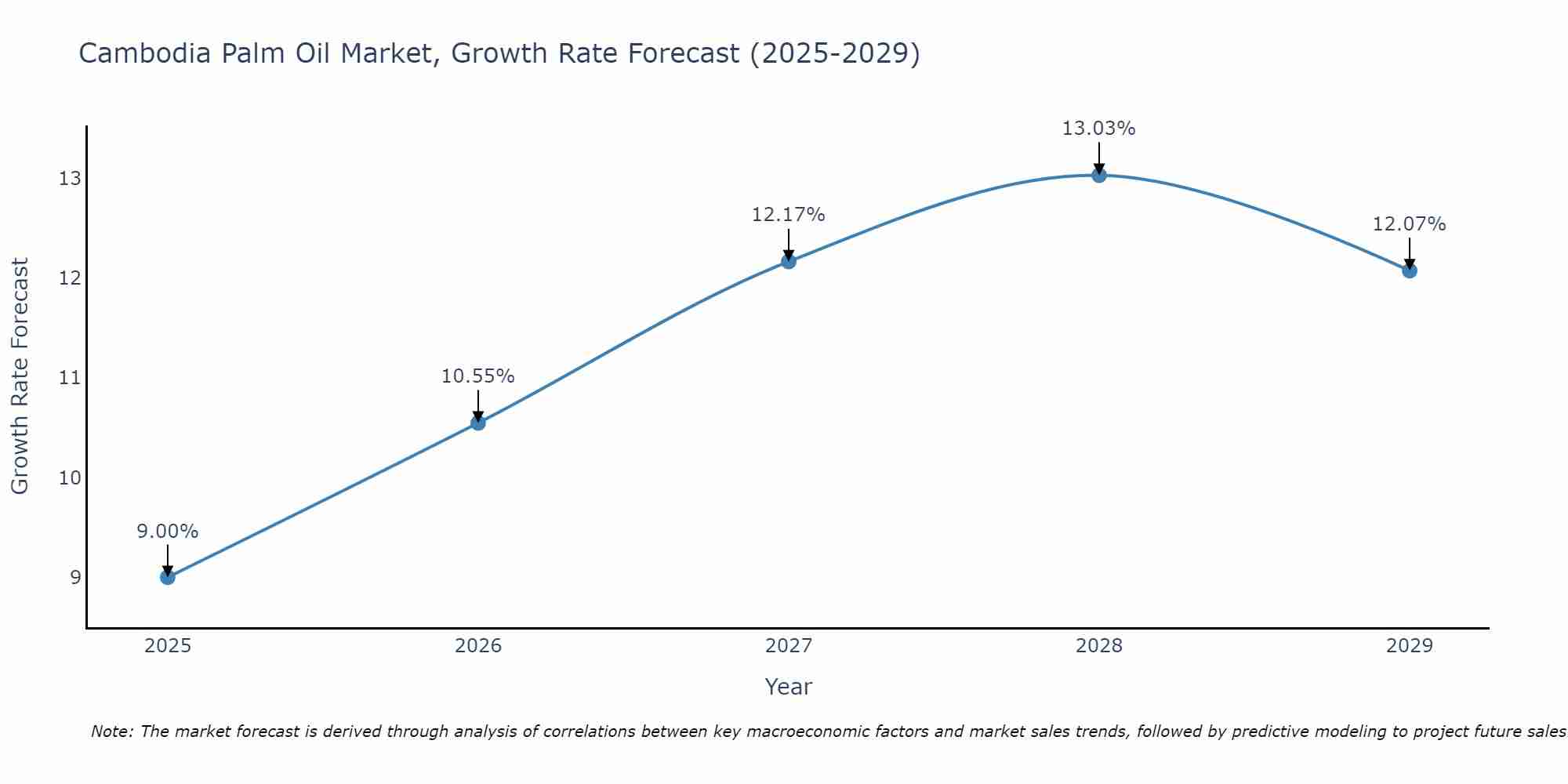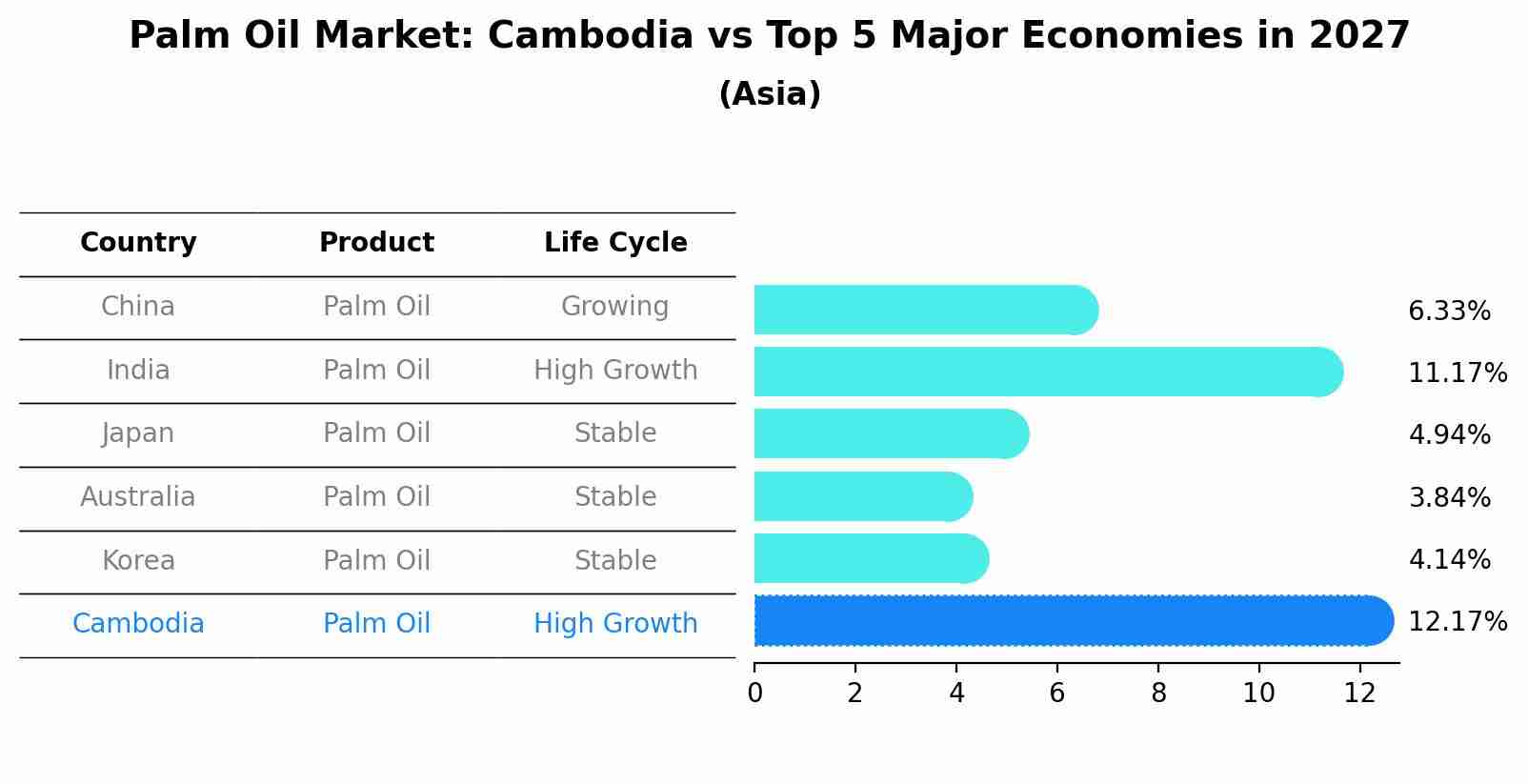Cambodia Palm Oil Market Outlook | Share, Industry, Analysis, Growth, Companies, Size, Forecast, Value, Revenue, Trends & COVID-19 IMPACT
| Product Code: ETC383793 | Publication Date: Aug 2022 | Updated Date: Jul 2025 | Product Type: Market Research Report | |
| Publisher: 6Wresearch | Author: Ravi Bhandari | No. of Pages: 75 | No. of Figures: 35 | No. of Tables: 20 |
Cambodia Palm Oil Market Size Growth Rate
The Cambodia Palm Oil Market is projected to witness mixed growth rate patterns during 2025 to 2029. Growth accelerates to 13.03% in 2028, following an initial rate of 9.00%, before easing to 12.07% at the end of the period.

Palm Oil Market: Cambodia vs Top 5 Major Economies in 2027 (Asia)
The Palm Oil market in Cambodia is projected to grow at a high growth rate of 12.17% by 2027, within the Asia region led by China, along with other countries like India, Japan, Australia and South Korea, collectively shaping a dynamic and evolving market environment driven by innovation and increasing adoption of emerging technologies.

Cambodia Palm Oil Market Synopsis
The Cambodia palm oil market is a growing industry driven by increasing demand for palm oil in various sectors such as food, cosmetics, and biofuels. The country has seen a rise in palm oil plantation investments, particularly in the northwestern provinces, leading to an expansion of production capacity. However, the industry has faced criticism for its environmental impact, particularly deforestation and biodiversity loss. With government initiatives to promote sustainable palm oil production and certifications such as RSPO gaining traction, there is a growing shift towards more responsible practices in the market. Overall, the Cambodia palm oil market presents opportunities for growth but also challenges in balancing economic development with environmental sustainability.
Cambodia Palm Oil Market Trends
In the Cambodia Palm Oil Market, sustainability and environmental impact are key trends driving consumer preferences and industry practices. There is a growing demand for sustainably sourced palm oil products, leading to increased certification initiatives and partnerships with sustainable palm oil producers. Additionally, there is a focus on promoting responsible production practices to minimize deforestation and protect biodiversity. Local companies are also investing in research and development to improve the efficiency and sustainability of palm oil production processes. With consumers becoming more conscious of the environmental and social implications of palm oil cultivation, market players are adapting their strategies to meet these evolving expectations and regulations.
Cambodia Palm Oil Market Challenges
The Cambodia Palm Oil Market faces several challenges, including environmental concerns related to deforestation and biodiversity loss caused by palm oil plantations. There are also social issues such as land rights conflicts with local communities and labor rights abuses in the industry. Additionally, the market struggles with low productivity and inefficient processing methods, hindering its competitiveness on a global scale. Lack of regulations and enforcement mechanisms further exacerbate these challenges, leading to unsustainable practices and negative impacts on the environment and society. Overall, addressing these multifaceted challenges is crucial for the sustainable development of the Cambodia Palm Oil Market.
Cambodia Palm Oil Market Investment Opportunities
Investment opportunities in the Cambodia Palm Oil Market include potential for growth due to increasing demand for palm oil globally, favorable government policies supporting the industry, and the country`s suitable climate for palm oil cultivation. Investors can consider opportunities in palm oil plantations, processing facilities, and related infrastructure development. Additionally, there is potential for value-added products such as biofuels and oleochemicals. However, it is important to note the environmental and social concerns associated with palm oil production, so sustainable and responsible investment practices are crucial. Conducting thorough market research, assessing regulatory frameworks, and understanding consumer trends will be key for successful investment in the Cambodia Palm Oil Market.
Jordan Agar Market Government Policies
The Cambodian government has introduced policies to regulate and promote sustainable practices in the palm oil market. In 2014, the government established a moratorium on the granting of new land concessions for oil palm plantations to address concerns about deforestation and land grabbing. Additionally, Cambodia has committed to the ASEAN Agreement on Transboundary Haze Pollution to prevent cross-border environmental issues related to palm oil production. The government has also implemented measures to improve transparency in the industry, such as requiring companies to disclose information on their land concessions and environmental impact assessments. Overall, these policies aim to balance economic development with environmental conservation in the Cambodian palm oil market.
Cambodia Palm Oil Market Future Outlook
The Cambodia palm oil market is expected to witness steady growth in the coming years due to increasing demand from various industries such as food and beverage, cosmetics, and personal care. The government`s initiatives to promote palm oil production as a key agricultural commodity will further drive market expansion. However, environmental concerns surrounding deforestation and biodiversity loss may pose challenges to sustainable palm oil production in the country. As a result, there is a growing trend towards promoting sustainable and environmentally friendly practices in the palm oil industry. Overall, the Cambodia palm oil market is likely to experience moderate growth with a focus on sustainability and responsible production practices to meet both consumer demands and environmental conservation efforts.
Key Highlights of the Report:
- Cambodia Palm Oil Market Outlook
- Market Size of Cambodia Palm Oil Market, 2021
- Forecast of Cambodia Palm Oil Market, 2031
- Historical Data and Forecast of Cambodia Palm Oil Revenues & Volume for the Period 2018 - 2031
- Cambodia Palm Oil Market Trend Evolution
- Cambodia Palm Oil Market Drivers and Challenges
- Cambodia Palm Oil Price Trends
- Cambodia Palm Oil Porter's Five Forces
- Cambodia Palm Oil Industry Life Cycle
- Historical Data and Forecast of Cambodia Palm Oil Market Revenues & Volume By Nature for the Period 2018 - 2031
- Historical Data and Forecast of Cambodia Palm Oil Market Revenues & Volume By Organic for the Period 2018 - 2031
- Historical Data and Forecast of Cambodia Palm Oil Market Revenues & Volume By Conventional for the Period 2018 - 2031
- Historical Data and Forecast of Cambodia Palm Oil Market Revenues & Volume By Product for the Period 2018 - 2031
- Historical Data and Forecast of Cambodia Palm Oil Market Revenues & Volume By CPO for the Period 2018 - 2031
- Historical Data and Forecast of Cambodia Palm Oil Market Revenues & Volume By RBD Palm Oil for the Period 2018 - 2031
- Historical Data and Forecast of Cambodia Palm Oil Market Revenues & Volume By Palm Kernel Oil for the Period 2018 - 2031
- Historical Data and Forecast of Cambodia Palm Oil Market Revenues & Volume By Fractionated Palm Oil for the Period 2018 - 2031
- Historical Data and Forecast of Cambodia Palm Oil Market Revenues & Volume By End-use for the Period 2018 - 2031
- Historical Data and Forecast of Cambodia Palm Oil Market Revenues & Volume By Food & Beverage for the Period 2018 - 2031
- Historical Data and Forecast of Cambodia Palm Oil Market Revenues & Volume By Personal Care & Cosmetics for the Period 2018 - 2031
- Historical Data and Forecast of Cambodia Palm Oil Market Revenues & Volume By Biofuel & Energy for the Period 2018 - 2031
- Historical Data and Forecast of Cambodia Palm Oil Market Revenues & Volume By Pharmaceuticals for the Period 2018 - 2031
- Historical Data and Forecast of Cambodia Palm Oil Market Revenues & Volume By Others for the Period 2018 - 2031
- Cambodia Palm Oil Import Export Trade Statistics
- Market Opportunity Assessment By Nature
- Market Opportunity Assessment By Product
- Market Opportunity Assessment By End-use
- Cambodia Palm Oil Top Companies Market Share
- Cambodia Palm Oil Competitive Benchmarking By Technical and Operational Parameters
- Cambodia Palm Oil Company Profiles
- Cambodia Palm Oil Key Strategic Recommendations
Frequently Asked Questions About the Market Study (FAQs):
- Single User License$ 1,995
- Department License$ 2,400
- Site License$ 3,120
- Global License$ 3,795
Search
Thought Leadership and Analyst Meet
Our Clients
Related Reports
- Afghanistan Rocking Chairs And Adirondack Chairs Market (2026-2032) | Size & Revenue, Competitive Landscape, Share, Segmentation, Industry, Value, Outlook, Analysis, Trends, Growth, Forecast, Companies
- Afghanistan Apparel Market (2026-2032) | Growth, Outlook, Industry, Segmentation, Forecast, Size, Companies, Trends, Value, Share, Analysis & Revenue
- Canada Oil and Gas Market (2026-2032) | Share, Segmentation, Value, Industry, Trends, Forecast, Analysis, Size & Revenue, Growth, Competitive Landscape, Outlook, Companies
- Germany Breakfast Food Market (2026-2032) | Industry, Share, Growth, Size, Companies, Value, Analysis, Revenue, Trends, Forecast & Outlook
- Australia Briquette Market (2025-2031) | Growth, Size, Revenue, Forecast, Analysis, Trends, Value, Share, Industry & Companies
- Vietnam System Integrator Market (2025-2031) | Size, Companies, Analysis, Industry, Value, Forecast, Growth, Trends, Revenue & Share
- ASEAN and Thailand Brain Health Supplements Market (2025-2031) | Strategy, Consumer Insights, Analysis, Investment Trends, Opportunities, Growth, Size, Share, Industry, Revenue, Segments, Value, Segmentation, Supply, Forecast, Restraints, Outlook, Competition, Drivers, Trends, Demand, Pricing Analysis, Competitive, Strategic Insights, Companies, Challenges
- ASEAN Bearings Market (2025-2031) | Strategy, Consumer Insights, Analysis, Investment Trends, Opportunities, Growth, Size, Share, Industry, Revenue, Segments, Value, Segmentation, Supply, Forecast, Restraints, Outlook, Competition, Drivers, Trends, Demand, Pricing Analysis, Competitive, Strategic Insights, Companies, Challenges
- Europe Flooring Market (2025-2031) | Outlook, Share, Industry, Trends, Forecast, Companies, Revenue, Size, Analysis, Growth & Value
- Saudi Arabia Manlift Market (2025-2031) | Outlook, Size, Growth, Trends, Companies, Industry, Revenue, Value, Share, Forecast & Analysis
Industry Events and Analyst Meet
Whitepaper
- Middle East & Africa Commercial Security Market Click here to view more.
- Middle East & Africa Fire Safety Systems & Equipment Market Click here to view more.
- GCC Drone Market Click here to view more.
- Middle East Lighting Fixture Market Click here to view more.
- GCC Physical & Perimeter Security Market Click here to view more.
6WResearch In News
- Doha a strategic location for EV manufacturing hub: IPA Qatar
- Demand for luxury TVs surging in the GCC, says Samsung
- Empowering Growth: The Thriving Journey of Bangladesh’s Cable Industry
- Demand for luxury TVs surging in the GCC, says Samsung
- Video call with a traditional healer? Once unthinkable, it’s now common in South Africa
- Intelligent Buildings To Smooth GCC’s Path To Net Zero


















